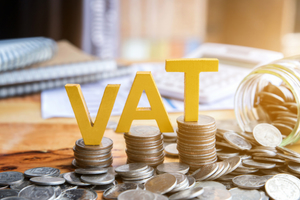
CUSTOM DUTIESIN SAUDI ARABIA& THE GCC
EXPERT CONSULTATIONCUSTOMS DUTIES
IN SAUDI ARABIA
Our Customs Duties service in Saudi Arabia is part of our tax consultancy services in Saudi Arabia.
Custom Duty is a tariff or a tax paid to the government imposed on good transported, imported or exported, across international borders. In general, the purpose of the custom duty is to protect the country’s economy, support local merchandise, provide form of protection to the country’s jobs and control the transport of restricted and prohibited products by regulating the flow of goods into and outside the country.
The custom duty is either specific or on ad valorem basis, it is a rate or a percentile determined by the total value of the goods paid for in another country; its value is not based on factors such as quality, size or weight of the good.
In general, each country imposes its own type of custom duties, and these are:
- Basic Customs Duty (BCD).
- Countervailing Duty (CVD).
- Additional Customs Duty or Special CVD.
- Protective Duty.
- Anti-dumping Duty.
WHAT IS THE DIFFERENCE BETWEEN A TAX AND A CUSTOMS DUTY?
A tax is placed on all types of goods sold or services provided in the country, both imported or exported, and taxation is considered a source of income generation for governments. On the other hand, a duty is a type of tax yet imposed only on goods being imported into the country, and its main purpose is to protect economies upon different aspects. Both taxes and duties are charged to the importer on his shipments that must be paid to the relevant authorities and adds on to the overall landed cost to be paid for a good imported to the country.
WHAT IS THE DIFFERENCE BETWEEN A TAX AND A CUSTOMS DUTY?
A duty is imposed to all goods being imported (except to exempted items), and it may vary depending on the nature of the good. A tariff is however, an additional fee charged on selected goods imported to the country generally in aim to discourage the import of those goods to protect local economies and jobs. Imported goods are classified using the HS and HTS code to determine the applied duty and tariff levied on the shipment.
Follow this link that contains the unified custom duty for GCC states on all goods.
WHAT IS IMPORT DUTY RECOVERY?
Importers of goods into the country are eligible for refund when they can demonstrate and prove that the amount they paid is in excess of the required duty, this is known as import duty recovery.
WHAT IS DUTY DRAWBACK?
Duty drawback is a form of import duty recovery, where the paid duty is refunded on goods that is only transiting through a country and are being re-exported out of the country. The business will need to provide certain proof documents for exit of goods.
WHAT IS A COUNTERVAILING DUTY?
Countervailing duties are special duties and tariffs granted by the International Trade Commission on special cases, where governments may provide aid and assistance to certain countries’ domestic industries to enable them to export their products for lower prices.
WHAT ARE ANTI-DUMPING DUTIES?
Anti-dumping duties are special duties charged to protect local industries from the imported foreign goods that may be sold in the domestic market at a lower value than the fair market price. The duty is used to eliminate the cost of dumping, and is determined by calculating the difference between the cost of production or price of the good in the country of origin and the price of the good sold in the local importing country.
CUSTOM DUTIES IN SAUDI ARABIA
Zakat, Tax and Customs Authority (“ZATCA”) is the regulatory authority of Customs Duty after the Saudi Council Ministers announced approval on May 2021 to merge the General Authority of Zakat and Tax (GAZT) and the General Authority of Customs.
Saudi Arabia uses the Harmonized Commodity Description and Coding System (HS Code) for tariff classification purposes. The customs duty rate is calculated on an ad valorem basis on the value of the good plus cost, freight, and insurance (“CIF”) value. Saudi Arabia also has a signed agreement with Gulf Cooperation Council (“GCC”) which allows member of the GCC countries total exemption of the custom duties, and a 5% custom duty on most goods imported from other non-GCC countries, 100% custom duty on cigarettes, 50% on carbonated drinks and 100% on energy drinks. However, several number of goods have reflected an increase on the imposed duty rates by up to 25%.
The last announced change on levied duty was on 12 June 2022 on the following goods:
- Live animals.
- Foodstuffs.
- Mineral products.
- Chemical products.
- Plastic products.
- Glass products.
- Base metals, namely aluminium.
- Machinery, equipment, electrical equipment.
- Vehicles.
Businesses are required to present a commercial invoice, a bill of lading, certificate of origin to import goods to Saudi Arabia, and complete the clearing procedure through registering at “Fasah” platform and submitting the required documents including the related declaration form at least 48 hours prior to the arrival of the imported goods at the port of entry. “Fasah” platform also provides guide to the custom clearance agents and freight brokers in the country.
Businesses also require reaching the Saudi Standards, Metrology and Quality Organization (“SASO”) to issue Product Conformity Certificate to ensure that the imported goods conform with the technical regulations and control quality standards of imported goods to the country, and afterwards obtain a consignment/shipment certificate for imported goods.
PROHIBITED AND RESTRICTED GOODS
There are some restricted products that require special approval by Saudi authorities for import including: agricultural seeds, live animals, books, periodicals, movies, and tapes; religious books and tapes; chemicals; pharmaceutical products; wireless equipment and radio-controlled model airplanes; horses; products containing alcohol; natural asphalt; and archaeological artifacts.
Saudi law prohibits importation of the following products: weapons, alcohol, all types of narcotic drugs, goods that contradict Islamic faith and public morals, used clothing, certain sculptures, as well as used, reconditioned and inlaid tires.
Follow this link for the list of restricted and banned products to export from Saudi Arabia.
CUSTOM DUTIES IN QATAR
The General Authority of Customs (“GAC”) is the regulatory authority in Qatar to monitor the import and export of goods in and out of the country.
Businesses are required to provide a custom declaration form to GAC upon arrival for clearance of imported goods. Business may use “Al-Naqeeb” online portal to finalise custom clearance procedures such as to check information related to tariffs, duty calculation, accessing customs data, complete a duty payment and a customs transaction.
The custom duty rate in Qatar is also set at a percentage value of goods which is 5%; however, the custom duty for urea and ammonia is 30%, steel is 20%, cigarettes and tobacco related products is 100%.
- Personal products and household items.
- Imports for charity.
- Imports of the diplomatic and military corporations and bodies.
- Imported goods cleared for the free zones and duty-free shops.
- Goods in transit at designated destinations.
Prohibited goods for import to the country include flammable goods, nuclear and radioactive materials, arms and explosives, narcotic drugs, and goods shipped from economically boycotted countries.
The Customs Department may run an inspection on the goods; usually by providing a prior notice to the shipment owner, and at his presence. Goods that are harmful or that are prohibited may be damaged or re-exported. Not that only, but also the business bears the cost of transportation to the examination place, packing and repacking, in case an examination is required.
- Imported goods in the name of the ruling family.
- Imported goods in the name of diplomatic and consular corporations, and the political mail.
CUSTOM DUTIES IN KUWAIT
Kuwait approved the custom duty regulation in 2003; setting the custom duty rate at 5% CIF on most goods, while tobacco products are levied at a rate of 100%. Some products such as foodstuff, medicines and medical items are exempted from the single customs tariff.
CUSTOM DUTIES IN OMAN
The Directorate General of Customs is the regulatory authority for customs control and security of imports and exports in Oman. A custom duty of 5% is generally levied on the majority of imported goods; however, the custom duty is 100% on alcohols, 50% on cement, 15% on paints and polyurethane products, to name few. While basic food commodities and goods manufactured within the GCC are exempted from the duty. The custom duty in Oman is also assessed on an ad valorem basis on the CIF value. Importing entities are required to provide a list of documents for clearance of the imported goods which include but not limited to the following: the original commercial invoice which should reflect an accurate description of the goods, bill of lading or airway bill, relevant certificate or permit for restricted imports and certificate of origin.
CUSTOM DUTIES IN BAHRAIN
In Bahrain, all goods are subject to custom duty at a rate of 5% of the value of the good including the CIF as per the unified customs tariff table unless exempted as per the GCC unified customs law or any other international agreement. While the custom duty is 225% for alcoholic beverages, 200% for cigarettes and 20% for paper and aluminium products.
Businesses looking to engage in import are required to electronically submit the customs/import declaration form to the customs department including all required documents such as bill of lading and invoice to issue an exit order and release of goods. Note, that goods are subject to inspection and examination as per the risk assessment standards criteria.











